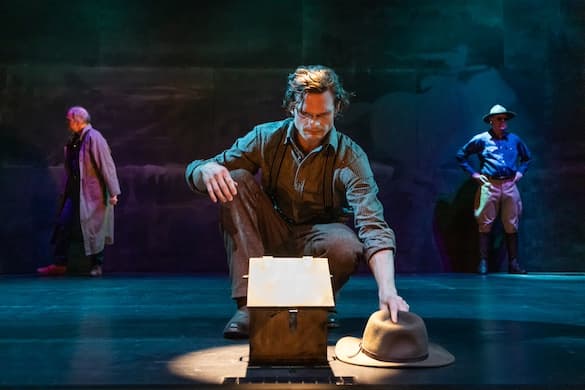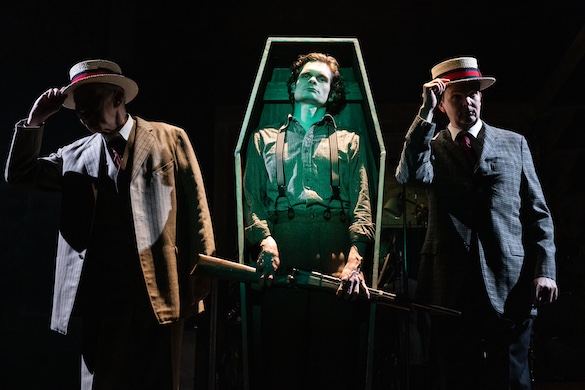‘Dead Outlaw’ Finds Humor While Tracing a Most Unusual, Morose Story
The real-life outlaw, one Elmer McCurdy, spent roughly 60 years as a mummified attraction, displayed in carnivals, sideshows, and even theater lobbies. If you like your comedy black, this is likely one for you.

The last time composer/lyricist David Yazbek, playwright Itamar Moses, and director David Cromer collaborated on a musical, the Tony Award-winning “The Band’s Visit,” their focus was on a group of traveling Egyptian musicians who got lost. In their latest collaboration, “Dead Outlaw,” the protagonist is an itinerant American who loses everything, including his life — and that ultimate loss goes down long before the curtain does.
In fact, by my estimation, the character of Elmer McCurdy — lifted from the annals of history, albeit less well-known than, say, Alexander Hamilton or Fanny Brice — spends nearly half his time on stage as a corpse. That’s only fitting, as the real McCurdy, after being killed by Oklahoma police following a foiled train robbery in 1911, spent roughly 60 years, or twice the length of his lifetime, as a mummified attraction, displayed in carnivals, sideshows, and even theater lobbies.
Sure, it’s a morose subject for a musical, but Messrs. Cromer, Moses, and Yazbek, along with Erik Della Penna, who co-wrote the music and lyrics with Mr. Yazbek, have fearlessly and expertly mined it for humor. If you like your comedy black — and a little blue, given the states of bodily decay suggested, if not exactly simulated, here — “Outlaw” offers as much fun as any respectable grownup is likely to have in public.
McCurdy’s tale is presented in semi-concert form, with a bandleader — played by a wry Jeb Brown, who doubles as another doomed miscreant — serving as narrator, and his musicians, among them Mr. Della Penna, who also sings, often taking center stage in Arnulfo Maldonado’s set. The actors pop up above, around, and in front of them to play out scenes stretching between the late 19th century and the 1970s, occasionally usurping lead-singer duties.

In turn, the musicians, who lend vigor and playfulness to Mr. Yazbek’s typically eclectic score — heavy on country and other rootsy textures here, but also venturing into lounge jazz, reggae, and industrial rock — figure into the action, if mostly as amused and bemused observers. We join them in watching Elmer’s sad, droll tale, which involves, prior to his death, a disturbed teenage mother and a murdered caretaker, and takes our anti-hero from Maine to Kansas to Osage County and from a stab at a proper job and domestic life into the final spiral that does him in.
Elmer, who will assume a bevy of false identities before his short journey ends, is played by an ideally cast Andrew Durand, fresh from his turn as a charming hayseed in last season’s similarly irreverent “Shucked.” Here Mr. Durand’s resonant singing voice and boyish appeal takes on darker tones; he’s also pressed with the considerable task of pretending to be a cadaver through most of the show’s second half — and while facing the audience, with Heather Gilbert’s lighting providing only intermittent relief.
It’s in this section that “Outlaw” becomes a satirical fable of American greed, as the living Elmer’s antics are outdone by the more privileged and sophisticated men who vie to profit from his misfortune. One noble fellow emerges, a Cherokee farmer and long-distance runner, modeled on the real-life marathon champion Andy Payne, who gets a muscular, exuberant number in his honor — sung by Trent Saunders, deftly channeling David Bowie.
Other musical highlights include a pair of gently plaintive ballads, delivered in a honeyed alto by Julia Knitel, who’s cast as two young women who form deep connections with Elmer. One of them meets him after he’s deceased, forming a one-sided relationship that, far from being grisly, or played for laughs, informs one of the show’s most unexpectedly touching sequences.
Yet however moved you may be by the social commentary or softer moments contained in “Dead Outlaw,” the show’s boisterous, irrepressible irreverence toward that bleakest of subjects is its main selling point. In a catchy romp titled simply “Dead,” Messrs. Brown and Della Penna giddily sing, “Your mama’s dead/Your daddy’s dead/Whole family’s dead/And so are you” — and then proceed, in their first round and in reprises sprinkled through the show, to cite famous figures ranging from Balzac to Abe Lincoln to Glenn Gould and Tupac Shakur, eventually nodding to living celebrities, just for the heck of it.
I left the theater with the song’s refrain bouncing around in my head, thanking heaven that death — given the right circumstances and context, and inspiration — can still be played for laughs.

